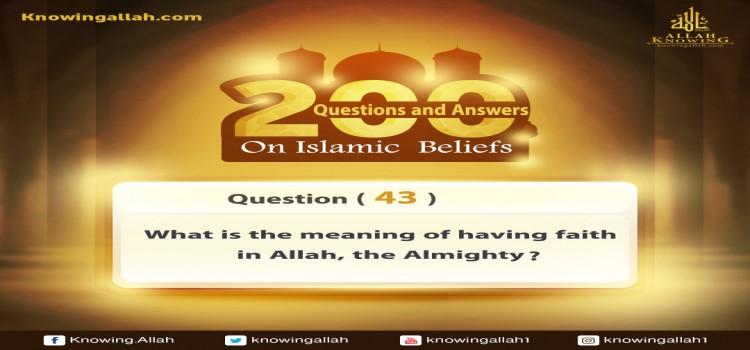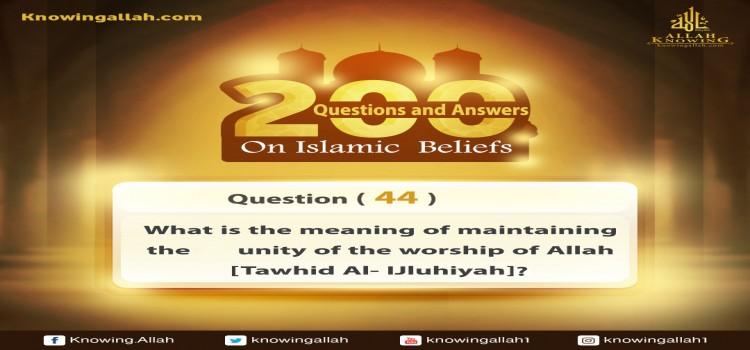Faith in the Oneness of Allah’s Worship
Faith in the Oneness of Allah’s Worship
Allah is the true ilah (the one who deserves to be worshiped). No one shares with Him this Right (of being worshiped) neither an Angel nor any Prophet. Therefore the call of all the Prophets from the first of them to the last of them was, "La ilaha illa Allah. (there is no ilah except Allah.)"
“We did not send any Messenger before you (O Muhammad ) but We inspired him (saying), 'La ilaha illa Ana' (there is no ilah except Me), so worship Me (Alone)." [Soorah al-Anbiya (21): 25] "Verily, We have sent among every nation, a Messenger (proclaiming), "Worship Allah (Alone), and avoid Taghoot (false deities)." [Soorah an-Nahl (16): 36]
So if someone believes in the Existence of Allah and believes in the
Rububiyah of Allah but he worships others alongside Allah then he is not a believer in Allah until he singles out Allah in His Uluhiyyah.
One might say that Allah approved the characteristic of Uluhiyyah (worship) for others besides Him. Allah said about Ibraheem, "Is it aliha (pl. of ilah) other than Allah that you seek?" [(37): 86] and Allah says, "Invoke not any other ilah along with Allah." [(28): 88] and other verses. So how can it be correct to say, "Allah is Alone in Uluhiyyah."
Reply: Uluhiyyah (worship) that is established for other than Allah is false Uluhiyyah. It is therefore absolutely denied, like in the saying of the Prophets to their nations, "Indeed, We sent Nuh to his people and he said, 'O my people! Worship Allah! You have no other Ilah but Him.'" [al-A'raf (7): 59] Those (other than Allah) are false ilah, "That is because Allah, He is the Truth and what they (the polytheist) invoke besides Him, it is Batil (false)." [al-Hajj (22): 62]
Shaikh Saleh al-Fawzan writes in Mujmal Aqeedah as-Salaf,
"Tawheed al-Uluhiyyah has (always) been the dispute between the Messengers and their nations. Every Messenger was sent summoning his nation, 'O my nation, worship Allah, there is no deity worthy of being worshiped except Him.' The Messengers did not summon their nations saying, 'O my people, verily Allah is your Lord' because all the nations believed in the Lordship of Allah.
The Messengers called their nation to worship their Lord alone for whom they affirmed Lordship and confessed that He is the Sole Creator, the Sole Sustainer and the One who runs the affairs of the universe. The Messengers called their nations to single out Allah just like they single out Him in Creation and the running of affairs. So the Messengers argued with their people based upon what they already affirmed.
The Qur'an mentions Tawheed ar-Rububiyah as an argument against the disbelievers and invites them to adhere to the necessary requirement of their belief. Oh disbelievers, if you accept that Allah is the Sole Creator, the Sole Provider and He Alone saves you from harm and destruction – then why do you turn towards others besides Him, those who have no authority in anything -neither creation, provision nor running the affairs of the universe, "Is then He, Who creates as one who creates not? Will you not then remember?" [(16): 17] So Tawheed al-Uluhiyyah is that which the Messengers called to.
There still exists dispute concerning Tawheed al-Uluhiyyah between the people of Tawheed and the people of misguidance. Those who posses the sound Aqeedah call those who have been misguided from Tawheed al-Uluhiyyah and returned to the Deen of the Mushrikeen by worshiping the graves and tombs, venerating saints and approving for them attributes of Lordship -that they should return back to the sound Aqeedah and single out Allah in His worship. They should abandon this dangerous matter which has overtaken them because it is the religion of the Jahiliyyah, rather it is worse than Jahiliyyah because the people of Jahiliyyah would become sincere to Allah at times of hardships and associate partners with Him only during ease.
But the Shirk of these misled people is continuous during ease and hardship. Rather their shirk during hardship is more severe! If matters become worse for them, you hear them calling out to the awliya and the dead for help whereas the Mushrikeen (at the time of Allah's Messenger ) would sincerely invoke Allah when they were afflicted with calamity...
So, Tawheed al-Uluhiyyah was the call of all the Messengers who called their nations to worship Allah alone and it is this category of Tawheed which was the cause of dispute (between the Prophets and their nations) and it is for this category of Tawheed that the Messengers fought the Mushrikeen until they abandoned shirk and this is the meaning of La ilaha illa Allah because ilah means the deity and therefore we understand La ilaha illa Allah to mean there is no true deity (worthy of being worshiped) except Allah. Ilah does not mean – as some misguided explain – the One who is capable of creating and originating!”
The following (until pg.44) is adapted from the book, Aqeedah at-Tawheed by Shaikh Saleh ibn Fawzan ibn Abdullah al-Fawzan
--------------------------------------
[end quote from Mujmal]
Read more about the deviant interpretations of La ilaha illa Allah in the Appendix, p. 55


![Q 73: Are all types of [Tawhid] the Oneness of Allah correlative?](https://media.knowingallah.com/media/articles/31a61_5be709ac9.jpg)
